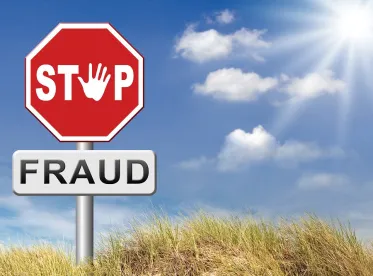After the Department of Justice charged more than 100 people last year with fraudulently seeking over $360 million in CARES Act emergency loans and other payments, the federal government has taken additional steps this year to combat fraud in federal COVID relief programs. These new efforts include expanding investigations and charging more criminal cases, initiating civil enforcement and forfeiture actions to recoup money to the Treasury, and hiring dedicated personnel to prosecute CARES Act fraud.
In passing the CARES (Coronavirus Aid, Relief, and Economic Security) Act and related legislation last year, Congress provided for several different types of emergency pandemic relief to be administered by the Small Business Association and other federal agencies. These include PPP (the Paycheck Protection Program), EIDL (Economic Injury Disaster Loans), PUA (Pandemic Unemployment Assistance), FPUC (Federal Pandemic Unemployment Compensation), and EIP (Economic Impact Payments). Of the more than $2 trillion dollars authorized under the CARES Act during 2020, over $500 billion dollars was allocated to PPP loans. A second round of PPP opened up in January, and applications for this round close on March 31. Many of these loans are forgivable in the event that participants in the programs comply with rules involving the use of the loan proceeds and related business operations, such as maintaining employees on payroll. These programs are focused on keeping smaller businesses and their employees afloat, and the loan statistics reflect that goal: The average PPP loan size has been just under $60,000, and more than 90% of PPP loans have been for $150,000 or less. Similarly, the average EIDL loan size has been a little over $50,000.
Like most fraud charges, the allegations in the COVID relief fraud cases involve two different types of conduct: fraudulent representations in the application for the relief funding, and fraudulent use of relief proceeds. The types of fraudulent representations at issue include the following: eligibility for relief; falsified business, employee, and tax records; and false certifications about criminal records and other issues. Most of the fraudulent uses in the cases brought to this point involve funds diverted for personal expenses, but at least one case involves allegations that a Utah defendant used the loan proceeds for business expenses that were different from those he included in the loan application. In another case, prosecutors brought fraud charges against several defendants even after those charged repaid loans and withdrew other loan applications.
Investigative and media scrutiny of COVID relief programs during the last few months has led to a dramatic expansion in the understanding of the probable scope of fraud related to applications for funding from these programs. On March 25, the House Select Subcommittee on the Coronavirus Crisis issued a memo on its recent findings on fraud in these programs. These findings include that:
-
Reviews of applications, records, and other data tend to show that there was around $84 billion in potential fraud from the PPP (more than $4 billion) and EIDL (more than $79 billion) government payments;
-
Over 1.3 million EIDL fraud referrals (over 700,000 of which involved identify theft) have been made to the SBA’s Inspector General’s Office;
-
Nearly 150,000 hotline complaints related to potential PPP or EIDL fraud have been made to the SBA Inspector General’s Office, an increase of almost 20,000% over previous years; and
-
Financial institutions filed over 41,000 Suspicious Activity Reports related to potential PPP and EIDL fraud during May-October 2020 alone.
Here’s how the House Subcommittee broke out some of the $84 billion in suspected fraud by type:
-
Approximately $67.5 billion went to applicants with duplicate email and physical addresses, IP information, and/or bank accounts;
-
Approximately $7.9 billion went to applicants with banking information that was different from the information on their applications;
-
Approximately $3.2 billion appears to have involved identity theft;
-
Approximately $3.6 billion went to borrowers on the Treasury Department’s Do Not Pay list; and
-
Approximately $557 million went to potentially ineligible recipients that registered Employer Identification Numbers after the program cutoff date.
While all of this is consistent with earlier reports that the FBI alone had already opened “several hundred” investigations into PPP fraud, there are now more than thirty federal and state agencies investigating allegations of fraud in these programs. In addition to the FBI, these include other DOJ-affiliated law enforcement agencies, various Offices of Inspector General, U.S. Secret Service, IRS-Criminal Investigation, Defense Criminal Investigative Services, Homeland Security Investigations, United States Postal Inspection Service, and the Financial Crimes Enforcement Network.
On March 26, DOJ issued an update on its efforts to combat CARES Act and related fraud. During the last year, more than 470 people have been publicly charged in 56 of the 94 federal districts with fraud and related crimes connected to the COVID pandemic, including more than 240 people charged with PPP and/or EIDL fraud. These cases represent over $569 million in attempted fraud from the government and others. DOJ has also obtained the first civil settlement related to CARES Act misconduct in a case from the Eastern District of California. In this settlement, a California company and one of its officers repaid all of the PPP funds it received plus $100,000 in damages and penalties. Civil enforcement moving forward will likely involve two of the statutes involved in the California case: The False Claims Act (FCA) and the Financial Institutions Reform, Recovery, and Enforcement Act (FIRREA). The FCA allows DOJ to seek damages and penalties for false claims for payment to the federal government, while FIRREA allows DOJ to seek civil penalties for violations of certain federal criminal statutes, including those involving federally-insured financial institutions. DOJ has also brought forfeiture and other actions to seize EIDL proceeds resulting from fraudulent CARES Act and other related applications; these efforts (many of which are being managed by the EIDL Fraud Task Force headquartered in the District of Colorado) have already produced seizures of over $626 million.
The increased insight into the scope of CARES Act fraud has been followed by an corresponding expansion in federal government resources toward the effort. The American Rescue Plan passed on March 11 included $142 million for Inspector General Offices and other watchdog organizations designed to investigate and uncover fraud. After instructing each U.S. Attorney’s Office to appoint a Coronavirus Fraud Coordinator to direct district efforts and to work with other districts and DOJ leadership in dealing with COVID-related fraud, DOJ announced earlier this month that it was creating three new prosecutor positions in the Market Integrity and Major Fraud (MIMF) Unit of the Fraud Section to work exclusively on investigations into CARES Act fraud (or “CAF”) cases. These three prosecutors will serve at least two-year terms focusing on CAF investigations with the other 45 prosecutors in the MIMF Unit and with Coronavirus Fraud Coordinators and other federal prosecutors around the country.
Marshaling additional resources and strengthening civil enforcement to combat COVID-related fraud more effectively increases the stakes for program funding recipients: Failure to follow SBA regulations or other rules related to program funding can result in treble damages and other significant penalties even if the conduct does not rise to the level of criminal charges. In light of these efforts (and with more certain to follow), working with counsel to establish a strong compliance regime will be even more important for companies that have received COVID relief funding from government agencies.




 />i
/>i

